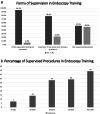Needs assessment of basic gastrointestinal endoscopy training: A qualitative study in Indonesia
- PMID: 38162844
- PMCID: PMC10757483
- DOI: 10.1002/jgh3.13004
Needs assessment of basic gastrointestinal endoscopy training: A qualitative study in Indonesia
Abstract
Background and aim: Gastointestinal endoscopy is a complex practical skill, and training and experience are required to ensure the accuracy and safety of the procedures. Therefore, proper endoscopy training is needed to provide highly skilled endoscopists. This study explores the learning experience and assesses the need for endoscopy training in Indonesia from an endoscopy trainee's point of view. Limitations from the current training model and the trainees' suggestions hopefully will become a foundation for the future endoscopy training model in Indonesia.
Methods: A total of 132 current endoscopy trainees and graduates of endoscopy training from various centers in Indonesia completed an online qualitative survey regarding their endoscopy training experience, their satisfaction with the current training method, barriers to achieving competency, and their suggestions for future training. Data were subjected to descriptive and qualitative analysis using content analysis.
Results: We found variations in the trainee's learning experience regarding the training supervision, feedback, and assessment methods. The most common endoscopy training methods were observation and direct practice with supervision. There was only a low proportion of simulator use (25%). The most found concept in barriers to achieving competency was "insufficient number of patients." Meanwhile, the most found concept in suggestions for future training methods was "increasing the variety of cases and procedures."
Conclusion: Our findings suggest that there are still variations in endoscopy training methods in Indonesia. Therefore, we propose to design a standardized endoscopy training program to ensure the competence of endoscopy trainees and better care for endoscopic patients. Simulators might be used to increase the trainees' competence in settings with low numbers of patients or cases.
Keywords: gastrointestinal endoscopy; medical education; medical training.
© 2023 The Authors. JGH Open published by Journal of Gastroenterology and Hepatology Foundation and John Wiley & Sons Australia, Ltd.
Figures

 , yes;
, yes;  , no. (b) Percentages of supervised procedures during endoscopy training.
, no. (b) Percentages of supervised procedures during endoscopy training.  , frequency.
, frequency.
 , yes;
, yes;  , no.
, no.
 , yes;
, yes;  , no.
, no.
 , yes;
, yes;  , no.
, no.Similar articles
-
Virtual reality simulation training for health professions trainees in gastrointestinal endoscopy.Cochrane Database Syst Rev. 2018 Aug 17;8(8):CD008237. doi: 10.1002/14651858.CD008237.pub3. Cochrane Database Syst Rev. 2018. PMID: 30117156 Free PMC article.
-
Trends in UK endoscopy training in the BSG trainees' national survey and strategic planning for the future.Frontline Gastroenterol. 2018 Jul;9(3):200-207. doi: 10.1136/flgastro-2017-100848. Epub 2017 Sep 23. Frontline Gastroenterol. 2018. PMID: 30046424 Free PMC article.
-
Status of Competency-Based Medical Education in Endoscopy Training: A Nationwide Survey of US ACGME-Accredited Gastroenterology Training Programs.Am J Gastroenterol. 2015 Jul;110(7):956-62. doi: 10.1038/ajg.2015.24. Epub 2015 Mar 24. Am J Gastroenterol. 2015. PMID: 25803401
-
Simulation-based mastery learning in gastrointestinal endoscopy training.World J Gastrointest Endosc. 2022 Sep 16;14(9):512-523. doi: 10.4253/wjge.v14.i9.512. World J Gastrointest Endosc. 2022. PMID: 36186944 Free PMC article. Review.
-
ASGE principles of endoscopic training.Gastrointest Endosc. 2019 Jul;90(1):27-34. doi: 10.1016/j.gie.2018.10.017. Epub 2019 May 20. Gastrointest Endosc. 2019. PMID: 31122745
Cited by
-
Prospective study on comparison of simulation-based mastery learning versus conventional apprentice-based learning for basic endoscopy training.J Gastroenterol Hepatol. 2024 Dec;39(12):2804-2810. doi: 10.1111/jgh.16794. Epub 2024 Nov 1. J Gastroenterol Hepatol. 2024. PMID: 39484698 Free PMC article.
References
-
- Simadibrata M, Adiwinata R. Current issues of gastroenterology in Indonesia. Acta Medica Indones. 2017; 49: 270. - PubMed
-
- Makmun D. Present status of endoscopy, therapeutic endoscopy and the endoscopy training system in Indonesia. Dig. Endosc. 2014; 26: 2–9. - PubMed
-
- Thuraisingam AI, MacDonald J, Shaw IS. Insights into endoscopy training: a qualitative study of learning experience. Med. Teach. 2006; 28: 453–459. - PubMed
-
- Boettger RK, Palmer LA. Quantitative content analysis: its use in technical communication. IEEE Trans. Prof. Commun. 2010; 53: 346–357.
LinkOut - more resources
Full Text Sources

